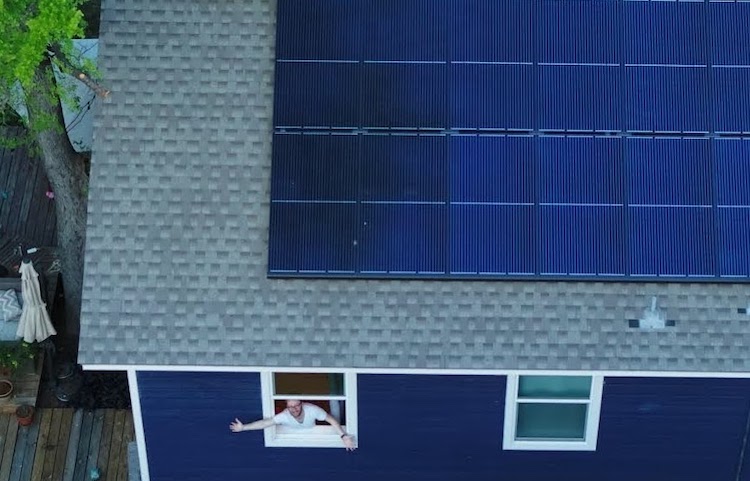Perfect timing for solar energy

Luke Metzger of Environment Texas looks up to the sky from his newly solar-paneled house in Austin.
The timing was perfect.
After advocating for solar energy for twenty years, I finally pulled the trigger and put solar panels on our home this spring. Solar prices have declined 60% in the last decade and financing our system meant my family didn’t have to pay any money out of pocket. The pandemic meant the timing was even better than I had anticipated.
Amid all the social upheaval, I feel more secure knowing I'm producing my own power. With utility workers declared “essential,” there thankfully hasn’t been any major disruption in service. But, even when utilities are fully staffed, a couple of downed power lines can leave thousands of people without power and cause large human and economic consequences. Homes and buildings with enough solar energy and energy storage capacity installed may be able to keep their own lights on during and immediately after outages. And while having a resilient power source in a blackout can be beneficial for personal and economic reasons, if hospitals, police stations or fire stations have extended blackouts, it can put lives at risk.
With my new rooftop panels, I’m also saving money on my energy bill at a time when we’re using a lot more electricity working and schooling from home (and with our A/C about to be working real hard). According to Energy Sage, the average Texan who goes solar would save a net of $13,000 over 20 years. And by installing solar panels, consumers protect themselves from the unpredictable swings and spikes in utility electricity costs. Solar panels also help reduce demand on the grid, which can lower electricity rates for all customers.
As an environmentalist, I’m happy to do my part to reduce air pollution as COVID-19, a respiratory disease, rages. Research shows people living in areas with polluted air having a higher chance of dying from the disease. Austin, with 108 days of elevated particle pollution in 2018, is, unfortunately, one of those areas. But replacing coal- and gas-fired power plants with solar energy reduces the particle emissions that harm our health while cutting the pollution fueling global warming (which itself is helping spread dangerous infectious diseases).
I’m far from the only one going solar. According to Austin Energy, solar capacity within Austin grew 22% last year. Solar panels on top of the new parking lot at the airport will provide clean energy to renters and others who can’t install solar on their own roofs, through a process known as “community solar.” In January, the Austin Independent School District (AISD) board approved a new facilities master plan and directed the district to consider adding solar panels as they “modernize all school buildings over the next 25 years.”
The sky’s the limit in our solar future. For example, if builders put solar panels on the 3.2 million new homes and apartment buildings expected to be built in Texas by 2045, Texas would increase solar capacity ten-fold increase while cutting carbon dioxide emissions.
Of course, like other industries, Texas’ clean energy sector is, and will continue to be, hard hit by the economic impacts of COVID-19. For example, more than 1,500 people work in solar in Travis County, but according to a recent national survey, 55% of solar workers have been laid off or suffered cuts to hours.
To maintain momentum in switching to clean energy, we’ll need the help of the government. Austin Energy and AISD should keep moving toward their goals for solar power, battery storage, and energy efficiency. Congress, as part of a future stimulus package, should extend tax incentives to make sure more people like me can go solar or buy energy-efficient appliances, batteries or electric vehicles. By offering incentives that promote clean energy, we can invest in cleaner technology that bolsters an industry in need of aid and one that is crucial to a better future.
As the executive director of Environment Texas, Luke Metzger is a leading voice in the state for clean air, clean water, clean energy, and open space. Luke, his wife, son, and daughters are working to visit every state park in Texas. He is a graduate of the University of Southern California.
Editor's note: The views expressed by contributors to the Cynthia and George Mitchell Foundation's blogging initiative are those of the author and do not necessarily represent the views of the foundation. The foundation works as an engine of change in both policy and practice, supporting high-impact projects at the nexus of environmental protection, social equity, and economic vibrancy. Follow the foundation on Facebook and Twitter, and sign up for regular updates from the foundation.

Hide Full Index
Show Full Index
View All Blog Posts